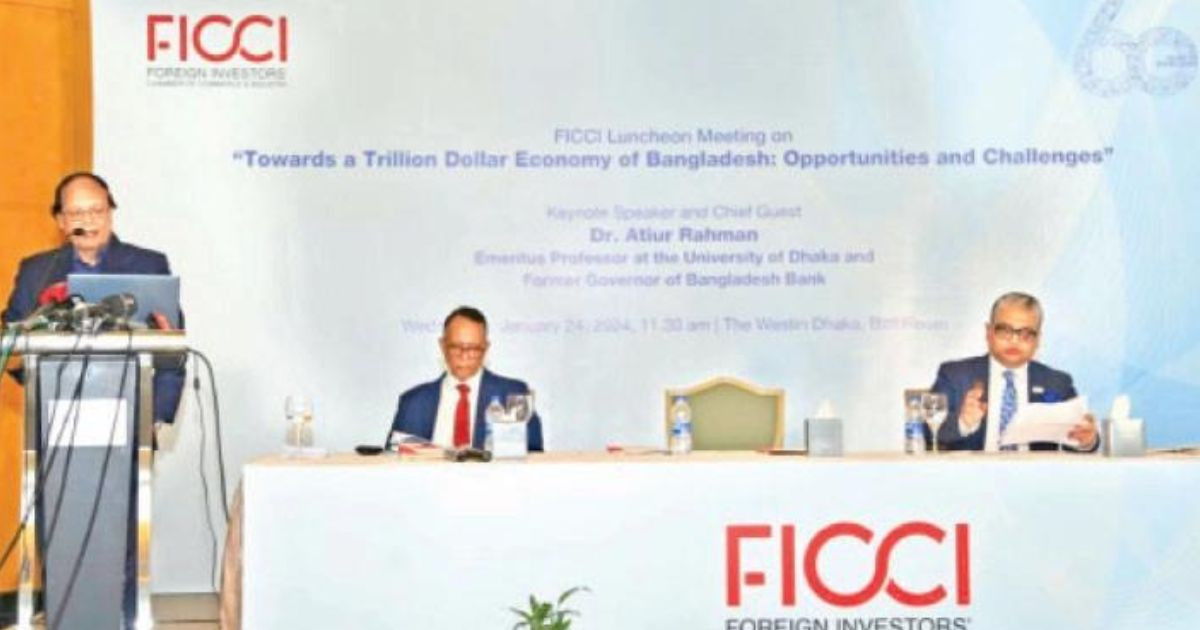Smart economic diplomacy stressed to promote Bangladesh as FDI destination
Daily Sun Report, Dhaka
Published: 25 Jan 2024

Former Bangladesh Bank governor Dr Atiur Rahman presents a keynote paper titled 'Towards a Trillion Dollar Economy of Bangladesh: Opportunities and Challenges,' organised by the FICCI in the capital on Wednesday. Photo: Courtesy
As high inflation is creating pressure on households, stabilising foreign exchange rate is significant to reduce the inflation. So, Bangladesh must ensure ‘smart economic diplomacy’ to promote Bangladesh as an attractive investment destination, former Bangladesh Bank Governor Dr Atiur Rahman said.
Dr Atiur, also emeritus professor of Dhaka University, made the remarks at a programme while presenting a keynote paper titled, “Towards a Trillion Dollar Economy of Bangladesh Opportunities and Challenges,” organised by the Foreign Investors’ Chamber of Commerce and Industry (FICCI) in the capital.
“Foreign direct investment (FDI) inflows need to be bolstered to realise Bangladesh’s macroeconomic potentials, particularly to stabilise its financial balance. The country should strengthen financial sector governance and bolster overall business confidence,” the economist also said.
Safeguarding households against inflation, Dr Atiur said because of necessary currency devaluation and rationalisation of subsidies, it will be difficult to significantly reduce inflation in 2024. Hence, deeper coordination between monetary and fiscal policy with prudent foreign exchange management is needed. New safety net measures will be required for low-income households (digital databases of beneficiaries, and digital transformation of benefits are prerequisites).
He also recommended making independent directors as the chairman of the board of directors to ensure good governance in private banks. “Corruption is a hindrance in economic growth of the country. Therefore, good governance must be ensured for streamlining bureaucratic hurdles and curbing corruption.”
He also said the new government must take initiative to reduce loan defaults, make favourable policies to ensure ‘ease of doing businesses’, and need to create adequate jobs for two million youth entering the workforce every year. Skilling and re-skilling the workforce is a must.
“Tomorrow’s Bangladesh will be digital, so the country must develop digital infrastructure, prioritise human capital development through stronger private sector participation with the academia and other training providers, and secure more ‘climate finance’ from international development partners focusing on green technology and renewable energy,” he also said.
Bangladesh is on track to become a trillion–dollar economy. With a modest 5% growth rate, the country’s economy will touch the trillion-dollar-mark by 2040. It can do so even faster by 2030 if a double-digit growth rate can be ensured. So, all stakeholders should be working together.
The FICCI can play a strong role to bring more FDIs in the country. Bangladesh’s success should be attributed to its multidimensional approach to sustainable development.
In post LDC graduation by 2026, there is a risk of losing 7% to 14% of exports due to loss of most-favoured nation (MFN) and duty-free quota-free (DFQF) access. So, Bangladesh must look for a new set of international support measures (ISMs) during the transition period (interest rates, grace periods for the loans from development partners). Bolstering exports and investments with special focus on FDI is pivotal. Revenue mobilisation must also be bolstered, he added.
The economist said dependence on high-cost energy imports remains a source of pressure on macroeconomic stability. The country should focus on reducing transport costs to supply foods at low cost.
Dr Atiur claimed that dependence on high-cost imports remains a source of pressure on macroeconomic stability. Bangladesh lags in terms of exploring new offshore gas and oil fields unlike India and Myanmar despite peaceful resolution of disputes over maritime boundaries.
He added that yet, micro, small and medium-sized companies (MSMEs) face structural bottlenecks such as access to finance, infrastructural barriers, undue VAT and AIT and technological shortcomings.
Speaking there, FICCI President Zaved Akhtar said, "Bangladesh has huge economic headwinds, but we will not go far by worrying about them. Rather, we should be concerned more about the chances we miss when we don't try when the opportunities arise in our country.”

